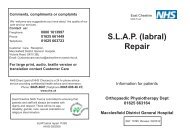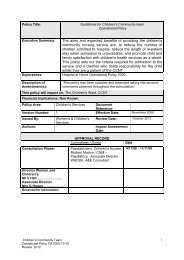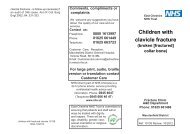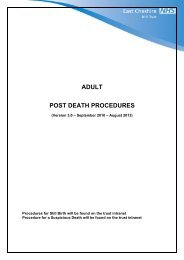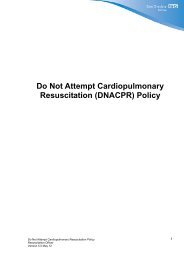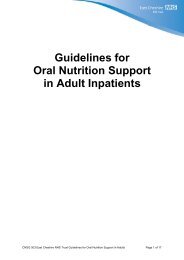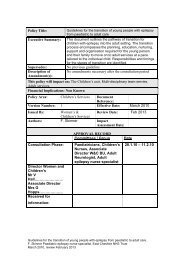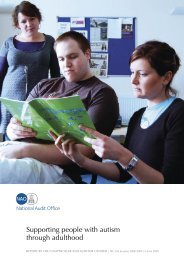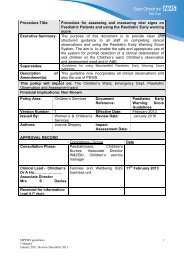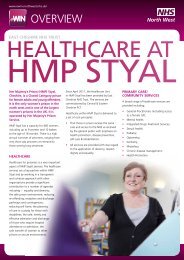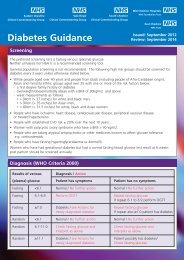Paediatric diabetes operational 1745.pdf - East Cheshire NHS Trust
Paediatric diabetes operational 1745.pdf - East Cheshire NHS Trust
Paediatric diabetes operational 1745.pdf - East Cheshire NHS Trust
You also want an ePaper? Increase the reach of your titles
YUMPU automatically turns print PDFs into web optimized ePapers that Google loves.
increase the frequency of their appointments and provide increased support with a view toimproving control. This will include home visits, visits to school and telephone support.The MDT offers a pump service to young people where it is felt that pump therapy isindicated. Currently we use the NICE guidelines to aid our decision making on when we canoffer pump therapy. The PDSN and the lead clinician have both attended a pump trainingcourse. We currently have 42 patients on insulin pumps.The service looks after a small number of young people who do not have classical type 1<strong>diabetes</strong>. We have patients with type 2 <strong>diabetes</strong> and <strong>diabetes</strong> associated with othersyndromes. We endeavor to make accurate diagnoses for all our patients and often liaisewith national or international experts for advice on the management of these moreuncommon types of <strong>diabetes</strong>.High HbA1c PolicyChildren that have HbA1c’s above 80mmol/mol (9.5%) are offered extra support andinterventions to help improve control. This is done in collaboration with the family andyoung person and an individual plan is negotiated. These plans may incorporate, troubleshooting, further <strong>diabetes</strong> education, insulin regimen change, more frequent contact viaphone, email, home visits etc, Continuous Glucose Monitoring,Teenagers with persistent high HbA1c’s who are not engaging with their <strong>diabetes</strong> treatmentare assessed to see if CAMHS referral is required.Currently in May 2012 the number of children and young people with an HbA1c above orequal to 9.5% is 23 which is 27% of the case load. The team recognises that this is a higherproportion than they would want. Increased resource to the team should help reduce thisnumber. The team will audit this number on a regular basis.DNA PolicyThe Diabetes team follows the trust paediatric DNA policy which incorporates safeguarding. A child with <strong>diabetes</strong> will never be discharged from follow up and every effort willbe made to engage the family and young person with services. If a child or young persondoes not attend or cancels a pre arranged clinic appointment, another time is given for thenext available clinic slot. If this is more than a month the PDSN will arrange to see the childsooner if this is required.The PDSN will aim to contact the child or young person to see if there are any specificproblems that may be preventing them from attending the clinics especially in the case ofregular non attendees. If the team has safe guarding concerns these will be discussed withthe named nurse for child protection.Escalation policyThe DKA and Safeguarding children policies give guidance on the how to escalate concerns,there is no specific escalation policy relating specifically to <strong>diabetes</strong>.Children’s Diabetes MDT Operational Policy May 23, 2012 15




